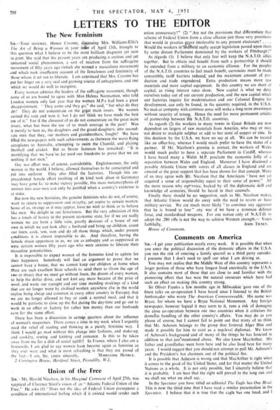Union of the Free
SIR.--Mr. Harold Nicolson, in his Marginal Comment of April 27th, was sceptical of Clarence Streit's vision of an " Atlantic Federal Union of the Free." He asks (I) " Does not the idea of Federal Union presuppose a condition of international feeling which if it existed would render such
union unnecessary?" (2) " Are not the provisions that differentiate that scheme of Federal Union from a close alliance just those very provisions that would in practicew intolerable to any present electorate? .... Would the workers in eld really accept legislation passed upon them by some distant Parliament dominated by the workers of Pittsburgh?" As regards (1). I believe that only fear will keep the N.A.T.O. allies together. But to obtain real benefit from such a partnership it should be extended from a military to an economic alliance. For the peoples of the N.A.T.O. countries to feel much benefit, currencies must be made convertible, tariff barriers reduced; and the maximum amount of pro- duction and trade engendered. Extra production means more raw materials and more capital equipment. In this country we are short of capital, as rising interest rates show. New capital is what we deny ourselves today out of our current production, and the new capital which our factories require for modernisation and our Colonial Empire for development, can only be found, in the quantity required, in the U.S.A. No man or company with common sense will make a long-term investment without security of tenure. Hence the need for more permanent articles of partnership betweenlie N.A.T.O. countries.
As regards (2) the workers in many towns in Great Britain are now dependent on largess of raw materials from America, who may or may 'not desire to stockpile sulphur or add to her store-of copper or zinc. In this decision by the U.S.A. we have no say at all. We can be treated like an office-boy, whereas I would much prefer to have the status of a partner. If Mr. Nicolson's premise is correct, the workers of Wales would much prefer to have a separate Parliament in Cardiff, whereas I have heard many a Welsh M.P. proclaim the economic folly of a separation between Wales and England. Moreover I have discussed a possible Atlantic Union with voters of all classes in England and am amazed at the great support that has been shown for that concept. Many of us may agree with Mr. Nicolson that the Americans " have not yet acquired a sense of responsibility equal to their sense of power." All the more reason why out voice, backed by all the diplomatic skill and knowledge of centuries, should be heard in their counsels.
Finally there should be no suggestion, such as Mr. Nicolson makes, that Atlantic Union would do away with the need to rearm or have military service. We are much more likely "to convince any aggressor that he is bound to lose" any war if we have a common defence force, and standardised weapons. For one nation only of N.A.T.O. to adopt the .280 rifle is not the way to achieve Western strength.— Yours


































 Previous page
Previous page